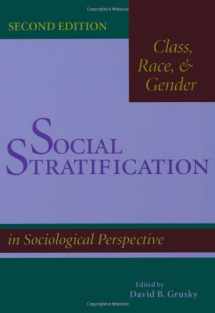
Social Stratification: Class, Race, and Gender in Sociological Perspective
Book details
Summary
Description
The field of stratification is being transformed and reshaped by advances in theory and quantitative modeling as well as by new approaches to the analysis of economic, racial, and gender inequality. Although these developments are revolutionary in their implications, until now there has been no comprehensive effort to bring together the classic and contemporary articles that define the contours of the field. In this revised and updated edition of Social Stratification, the history of stratification research unfolds in systematic fashion, with the introductory articles in each section providing examples of the major research traditions in the field and the concluding essays (commissioned from leading scholars) providing broader programmatic statements that identify current controversies and unresolved issues. The resulting collection of articles both celebrates the diversity of theoretical approaches and reveals the cumulative nature of ongoing research. This comprehensive reader is designed as a primary text for introductory courses on social stratification and as a supplementary text for advanced courses on social classes, occupations, labor markets, or social mobility. The following types of questions and debates are addressed in the six sections of the reader:Forms and Sources of Stratification: What are the major forms of inequality in human history? Can the ubiquity of inequality be attributed to individual differences in talent or ability? Is some form of inequality an inevitable feature of human life? The Structure of Contemporary Stratification: What are the principal "fault lines" or social cleavages that define the contemporary class structure? Have these cleavages strengthened or weakened with the transition to modernity and postmodernity? Generating Stratification: How frequently do individuals move into new classes, occupations, or income groups? Is there a permanent "underclass?" To what extent are occupational outcomes determined by such forces as intelligence, effort, schooling, aspirations, social contacts, and individual luck? The Consequences of Stratification: How are the life-styles, attitudes, and behaviors of individuals shaped by their class locations? Are there identifiable "class cultures" in past and present societies? Ascriptive Processes: What types of social processes and state policies serve to maintain or alter racial, ethnic, and sex discrimination in labor markets? Have these forms of discrimination weakened or strengthened with the transition to modernity and postmodernity? The Future of Stratification: Will stratification systems take on completely new and distinctive forms in the future? How unequal will these systems be? Is the concept of social class still useful in describing postmodern forms of stratification? Are stratification systems gradually shedding their distinctive features and converging towards some common (i.e., "postmodern") regime? The volume offers essential reading for undergraduates who need an introduction to the field, for graduate students who wish to broaden their understanding of stratification research, and for advanced scholars who seek a basic reference guide. Although most of the selections are middle-range theoretical pieces suitable for introductory courses, the anthology also includes advanced contributions on the cutting edge of research. The editor outlines a modified study plan for undergraduate students requiring a basic introduction to the field.


We would LOVE it if you could help us and other readers by reviewing the book
Book review



